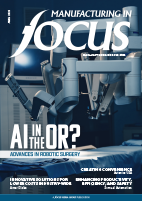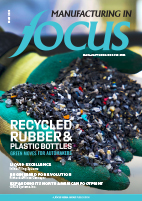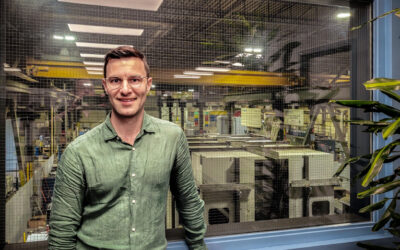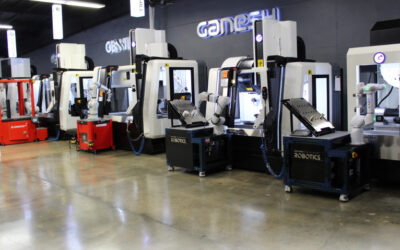Brushes, while they are often overlooked in terms of the critical role they play in consumer, commercial and industrial markets, are used in thousands of industries and sectors. Brushes might operate behind the scenes, but they are an integral part of manufacturing and processing operations around the globe.
~
From the food we eat to the appliances we use and everything in between, brushes were a part of the process that helped those products get to market. They are used in processing machinery for a myriad of uses from polishing and sweeping to peeling, cushioning, transferring and more.
Industrial Brush Corporation (IBC) was created in 1947 and made brushes for cleaning vehicles and citrus fruit. However, its past goes back even further. The company founder had previously purchased Pioneer Brush in 1927, and that firm already had a history that dated to 1896. Pioneer Brush was purchased by Food Machinery Company (FMC) which saw the value of its brushes for use in the equipment used for food processing. FMC would return to buy IBC in the 1970s before selling it to three employees in 1985.
IBC is a reliable manufacturing partner that provides brushes for conveyor cleaning, wood processing, condenser tube cleaning, glass washing, egg cleaning, food and produce processing and so much more. Most equipment manufacturers for the fruit and vegetable processing industry use IBC brushes. In food processing, its brushes not only wash and dry but also peel produce.
When brushes are worn, trimming or wrapping with new material to true the surface can extend the brush life for minimal cost. If a customer does not yet need a replacement, brushes can also be repaired to be just like new. IBC’s services include retrimming, rewrapping, brush repair and replacement.
Sales professionals can help customers find the perfect brush for their requirements. The company’s engineers will design custom brushes to meet a specific need, and IBC will then manufacture a custom product and can replicate any brush on the market, even if the brush is not an IBC design. It will choose from a wide variety of materials to do what it takes to develop a brush that meets an industry-specific or customer-specific use.
“A lot of companies have something you can buy off the shelf. We don’t have anything that you can just come and buy off the shelf from us,” explained Greg Tripp, vice president. IBC produces a wide variety of brushes used in a highly diverse range of industries.
“We’re a custom brush manufacturer, and we supply many different aspects of the brush business. Everything is custom. We manufacture for the customers’ request, and that’s been good for us. We can make one or one thousand of any product we design,” Greg Tripp said. All brushes are accurately produced using only premier quality materials.
IBC always strives to provide quality brush designs, exceptional service, and do all of that on time. “We are definitely very customer-driven as far as what they are looking for, but we’re able to stock a very large volume of raw materials and many different types of either synthetic fiber or bristles or natural fibers, many different sizes of steel tubing that might be used in the construction of different types of brushes,” said James Cottam, director of operations at IBC.
This inventory helps to decrease lead times for its customers. Where other brush companies operate with lead times of five to six weeks, IBC can shorten lead times to two to three weeks.
Quality assurance is always a priority to prevent product failures that could lead to downtime in its customers’ operation. Quality and safety are supervised at every stage of manufacturing, and products are carefully inspected before they are packaged and shipped.
“We hold weekly meetings with members of our team that focus on safety and quality. We have first article inspection reports that are filled out on every product we run, and we have production team leaders who are constantly supervising, making sure the products are inspected before they are packaged and shipped out,” said James Cottam.
“The last thing we want to do is ship product that has a defect in it to one of our customers,” he added. “If we find out that there has been a mistake made on a brush, it could be a large order, before it goes out that door, if we find a mistake, and we cannot correct that mistake, we will scrap that product and remake it because quality is paramount, and we’ve built our reputation on that.”
Greg Tripp said, “Every person comes into contact, whether directly or indirectly, with thirty-eight different brushes on a daily basis. Most of the time you don’t even know it.” While the exact source of the information was unknown, it does show the magnitude of the role that brushes play in our day-to-day lives and why quality has to be paramount.
Given the number of its brush products across industries and sectors, IBC is always looking to improve the value it offers to its customers, whether that means modernizing its machinery and improving its workflow or completely relocating to a new city and state where it could gain a greater competitive advantage.
The leadership at IBC recognized that the business climate in California was becoming less conducive to operating efficiently and productively. It was not bound to the state as a manufacturer, since it had no storefront or market presence to maintain, so relocation would serve it well.
“We looked into many different locations where we could relocate and still have a presence on the west coast and decided on Saint George, Utah, primarily because the business climate here is much more favorable than Southern California,” James Cottam explained.
IBC made the move from Pomona, California to Saint George, Utah in search of cost savings and a more favorable business climate which would help it maintain an economic edge. Not only did it save money in taxes and regulatory costs, the move reduced many other manufacturing costs enabling it to bring better value to its customers, and it gained access to a new and impressive talent pool. The move was also advantageous for its employees, and many of them made the move with the company.
“Our utilities are a lot cheaper which is a big deal for a manufacturer like us. With the kinds of equipment we run, we obviously use a lot of electricity. Also, for things like workers’ compensation and insurance, it has been favorable to us as well. It’s just an overall significant cost reduction,” said John C. Cottam, director of technology and business development. These savings have been reinvested in the company.
“The other thing is, we were able to have our employees afford things like housing and things they couldn’t afford in Southern California,” Greg Tripp noted. “When many of our employees moved out to Saint George, Utah, they were able to buy a better house, or even buy a house, so it was a win-win for everybody.”
Because IBC recognized the critical role its employees played in its success, great pains were taken to make certain that when the company made the move, as many employees as possible accompanied it. Eighty-two percent of its workforce uprooted and joined the company in Saint George, and they are credited with helping the move go without a hitch, which, when you think about it, is quite an impressive feat.
“If you can imagine trying to relocate an entire manufacturing facility with all the machinery and all of the raw materials we stock, and with all of the employees that are trying to buy and sell housing. You throw all of that into the mix, along with us trying to maintain a two to three week lead time and having all these open orders in-house,” James Cottam noted and said that this was not easy.
From the time IBC turned off its last machine in California to the time the last machine was set up and operational in Utah, with all employees on deck, took a total of eight business days. The move was well-planned and was a terrific success.
“As soon as everything was taken down in California, it was loaded on a truck, driven up here, and the riggers were able to place it here, and we had electricians on hand to make sure it got up and running, and our operator was there at that time as well,” said James Cottam. “The only way we would have been able to make that more streamlined and efficient is if we could have actually made brushes on the road.”
In addition to its Saint George facility, IBC enjoys added manufacturing capacity at its Lakeland, Florida operations. James Cottam said that efforts are always being undertaken to improve the company’s processes, and since moving to Utah, it has been able to fund an entirely new program at its Florida facility.
“We have a research and development department there. More specifically, they are building totally new machinery for us, which is our proprietary machinery, and the reason for that is to be able to do things more efficiently and more effectively to bring our costs down further and improve quality and also the on-time delivery of those products to our customers,” he explained.
Given that IBC offers a customized product, product innovation is driven by customer need. Innovation is key to the continuous improvement of its manufacturing facilities and processes.
Greg Tripp highlighted IBC’s main differences from the competition. “Most brush companies are smaller, not always Ma and Pa type companies, but there are a lot out there. We’re innovative in our manufacturing process and machinery. We have a very competitive product at a competitive price, and we always strive for quality.”
“One of the things that set us apart is, we’re a large enough company where we’re able to address the needs of customers around the country effectively. But we’re also innovative, nimble and agile to handle anything from a small order to large orders with a very high volume and everything in between,” John C. Cottam says.
At IBC, brushes are not simply a commodity manufactured by a machine. They are an art form that has been perfected over time by highly-skilled employees, some of whom have been with the company for twenty to thirty years or more.
IBC ensures its employees are equipped with the most modern machinery available to remain efficient, which, in turn, reduces lead times and improves customer satisfaction.
Investments are continually being made in the company to improve manufacturing efficiency, output, and, of course, IBC’s ability to serve its customers. It is committed to fairness with its customers and employees alike, which has created a culture of reciprocal gratitude and loyalty.
As it grows, IBC is building on its past to secure a bright and viable future for itself. It continues to offer the highest-quality brushes for every use.
“Our short-term goal is to do what we’re already doing better, and the long-term goal would be to do what we’re not doing at all,” John C. Cottam shared. And this leaves IBC with much work as it strives for continual improvement.













